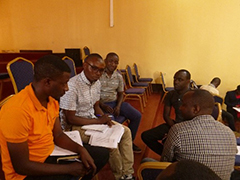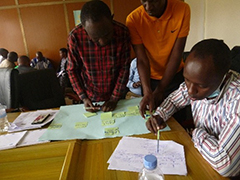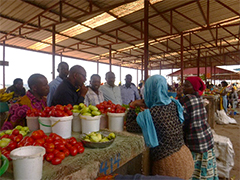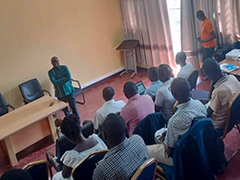- Home
- Technical Cooperation Projects
- Index of Countries
- Africa
- Rwanda
- Project for Water Management and Capacity Building
- Project News
- SHEP workshop were implemented in WAMCAB targeted Districts.
Project News
2022-09-15
SHEP workshop were implemented in WAMCAB targeted Districts.
The Technical Guidance Phase is proceeding in WAMCAB model sites and activities of capacitating beneficiaries are being implemented. From April 2023, Institutionalization and Extension Preparation Phase activities within the model sites and the neighboring sites are forthcoming .
The five outputs are set to achieve main goal which is "The models of scheme management by IWUOs are accepted in the target Districts" and output 5 is "Farm management is properly implemented in the model sites" which supports the farm management activities of cooperatives and farmers who are end users of irrigation facilities. As activities of output 5, cultivation technique training have been conducted in established demo plots for farmers to get appropriate techniques and increase productivity. Also, cooperative management and gender mainstreaming training have been implemented to build capacity of cooperative. We also conduct trial cultivation of vegetables with high market value and export crops to attract the interest of farmers.
In August 2022, WAMCAB organized and conducted Smallholder Horticulture Empowerment and Promotion (SHEP) workshop (hereinafter called SHEP WS). SHEP is extension approach to transform farmers mind set in general from ‘grow and sell 'to ‘grow to sell' through improvement of faming activity and farmers' cultivation techniques to increase farmers' income. The WS invited seven Task Force members (hereinafter called TF members)[1] and the Sector Agronomists (hereinafter called SA) from the target counties. In Rwanda, the administrative units are District, Sectors, cells, villages, and there are SA in each sector. SA provides a variety of farming support and management services to farmers at the cell and village level. In order to widely disseminate the SHEP approach to the end of the field, we thought that the key to success would be the utilization of human resources close to the field, therefore, we selected SA as a participant.
SHEP WS was organized in collaboration with Gisagara, Rwamagana and Ngoma districts for each two days. Not only Japanese experts, but also a TF member was a main trainer, who was the trainer of the JICA training program on Market-oriented Agriculture Promotion (Planning and Management)[2]. The WS consisted of two parts, a classroom study and an exercise, in which participants were explained the objectives and concepts of SHEP, and participants conducted market survey, selected crops and created crop calendars in accordance with the steps of SHEP.
At the beginning, all were challenged and confused how SHEP approach is different from other existing extension approach in the country called "Twigire muhinzi"[3] and how to incorporate with their main business Crop Intensification Program (CIP)[4] Land consolidation. However, after practicing SHEP activity such as market survey, crop selection and making crop calendar in group work, heated exchanges of opinions were held and questions were resolved, and they understood the concept of SHEP and its impacts in the countries where it developed before. In the latter half of the WS, participants conducted problem analysis and objective analysis in line with the PCM method to identify the problems and issues faced by the local level in charge, and in the objective analysis, proposed solutions that could be intervened by the participants' mandate. Based on the results of these analyses, each SA made an action plan to promote SHEP.
All SA committed to implement this approach in their daily activities and sharing the skills to other farmers to make agricultural profitable. WAMCAB continue to support the activities of SA and expect them to transfer knowledge what they have learnt and mobilize SHEP approach in their respecting area.
Notes
- [1] Task Force is an organization established to strengthen the vertical coordination between the central level and local government and the horizontal coordination between organizations and departments. It consists of RAB (Rwanda Agriculture and Animal Resources Development Board) station staff and District office staff.
- [2] The training was conducted by JICA headquarter in May 2022. Current position is an RAB station officer.
- [3] Farmer-to-farmer agricultural extension model program undertaken by the government
- [4] The governmental program to ensure food security and self-sufficiency by promoting the cultivation of cereals such as maize and rice.
 Making crop calendar at Giasagara
Making crop calendar at Giasagara
 Problem analysis at Rwamagana
Problem analysis at Rwamagana
 Markey survey in local market at Ngoma
Markey survey in local market at Ngoma
 Gisagara District Mayor appreciated SHEP Workshop
Gisagara District Mayor appreciated SHEP Workshop
(WAMCAB National Expert: BENINKA Geraldine)
- About JICA
- News & Features
- Countries & Regions
- Our Work
- Thematic Issues
- Types of Assistance
- Partnerships with Other Development Partners
- Climate Change / Environmental and Social Considerations
- Evaluations
- Compliance and Anti-corruption
- Science and Technology Cooperation on Global Issues
- Research
- JICA Development Studies Program / JICA Chair
- Support for the Acceptance of Foreign HRs / Multicultural and Inclusive Community
- Publications
- Investor Relations
